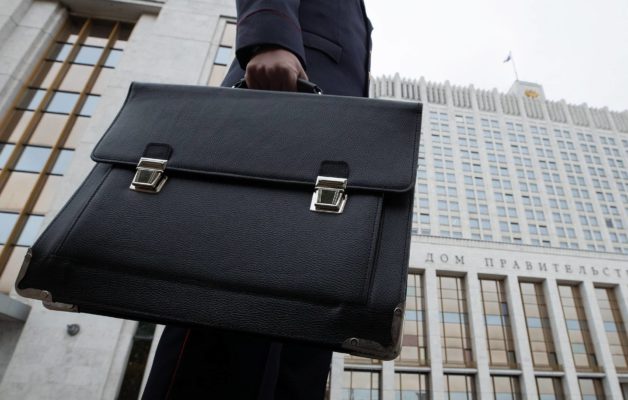
SUM scientists have determined the length of service required to reach the position of a minister in Russia
The average length of service before being awarded a ministerial post is 20.5 years.
Researchers at the State University of Management have calculated the rate of career development for current heads of federal ministries and their deputies in order to determine the length of service required for occupying executive positions. The average time before being awarded a ministerial post is 20.5 years, yet that may be reduced in the next decade, TASS learned from Olga Kryshtanovskaya, Head of Research and Director of SUM’s Centre for the Study of Russian Elites, on Wednesday.
The rate of career development refers to the number of years that have passed from the beginning of a person’s career to the moment that they are appointed to a specific position. It turned out that the current ministers were promoted at a lower rate than their deputies. In some cases, the difference in length of service exceeds 10 years.
We calculated the average rate of career development for heads of Russian ministries and heads of federal agencies and services based on an analysis of the career paths of the heads of 72 federal agencies and the average length of their service at the time of their appointment to the post in question. We found that it took them 20.5 years on average to reach their current positions,
a researcher told TASS, noting that the average age of federal ministers today is 53, and their deputies are statistically 2.5 years younger on average.
Deputy ministers have a much higher rate of career progression. While the average length of service before becoming a deputy minister is 22.3 years, it took about 16 years for people born in the 1970s–1980s.
The average rate of reaching a deputy minister position for those born in the 1970s and 1980s is 16.4 years. This is an important trend indicating not just a single occurrence of young people in high positions but their mass advancement upward, which is accelerating. This is also evidenced by the six-year difference in the rates of transition to deputy minister posts between those born in the 1970s and 1980s,
said Kryshtanovskaya, noting that eight of today’s deputies, who were born in the 1980s, have had under 10 years of career path.
Careerist’s choice
She noted that law enforcers and diplomats are moving at lower rates than representatives in the economic section of the government. The latter reach the post of deputy minister on average six years earlier than their colleagues. When comparing the speed of promotion, scientists divided the departments into those that are under the direct control of the President of the Russian Federation and belong to the security agencies and foreign policy departments (Ministry of Foreign Affairs, FSB, Federal National Guard Troops Service (Rosgvardiya), Ministry of Internal Affairs etc) and those that are subordinate to the Prime Minister of the Russian Federation and represent economic and social units (Ministry of Economic Development, Ministry of Education, Ministry of Culture, Ministry of Health etc).
According to Kryshtanovskaya, it takes an average of 27 years for a deputy to reach the post of deputy in agencies under the direct control of the President of the Russian Federation, while in agencies subordinate to the Prime Minister it takes 21 years.
Scientists ranked Rospatent and Rosakkreditatsiya (subordinate to the Ministry of Economic Development and Trade of the Russian Federation) as maximum mobility agencies, where a deputy post can be reached within 13 years on average. Those seeking to make a career quickly should look at the Federal Medical and Biological Agency; Federal Service for Supervision of Communications, Information Technology and Mass Media (Roskomnadzor); Federal Education and Science Supervision Agency (Rosobrnadzor), Federal Antimonopoly Service and the Ministry of Communications. Representatives from the Ministry of Sports (33 years to a deputy minister), Federal National Guard Troops Service (32.6 years) and the Ministry of Internal Affairs (32.5 years) have the lowest career growth rates. The highest mobility agencies directly subordinate to the President of the Russian Federation are the Office of the President (18.5 years) and Federal Agency for CIS Affairs, Compatriots Living Abroad and International Humanitarian Cooperation (Rossotrudnichestvo) (21 years).
Having compared data of officials in Moscow, Saint Petersburg and other subjects of the Russian Federation, the authors of the study concluded that regional officials need on average 24 years to achieve the status of a second-in-command in a ministry, while residents of Moscow and Saint Petersburg are taking similar positions three years earlier.
About the study
During 2019, as part of a research supported by a grant from the Russian Foundation for Basic Research, scientists analysed biographical information published in open sources about 370 so-called second-in-commands, deputy federal ministers and heads of government agencies and services.
The data collected on age, income, state awards, education and other characteristics were analysed using mathematical algorithms. As a result, researchers were able to draw a number of conclusions about the characteristics of today’s ruling elite and make forecasts for the next decade. The indicators of the officials studied were also compared with the career achievements of heads of ministries and departments.
Source: TASS
Study report Key Trends in the Development of Russia’s Ruling Elite 2019–2030.
Подпишись на тг-канал "Наш ГУУ" Дата публикации: 25.12.2019
Дата публикации: 25.12.2019


